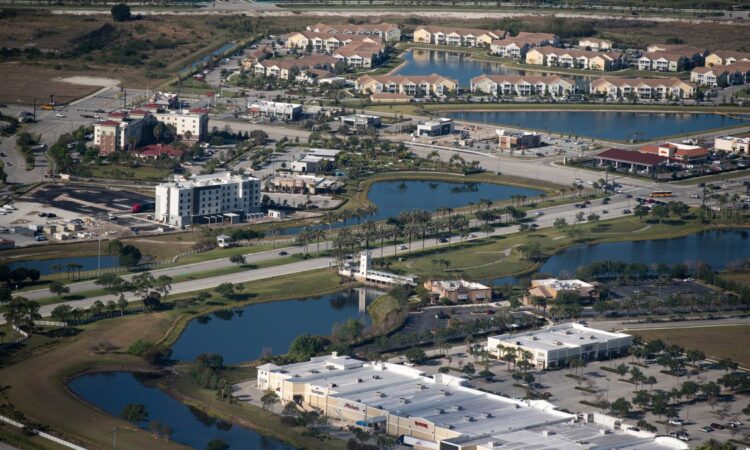
Cheney Express: Your ‘secret’ grocery store in Port St. Lucie
Cheney Brothers Inc. has a small grocery store open to the public at its warehouse in Port St. Lucie
- Property values in St. Lucie County continue to climb, increasing for the 13th straight year, according to the preliminary tax roll released by the property appraiser.
- However, those increases continue to slow down.
- A new state law, which increases the Homestead exemption at a rate tied to inflation, may have a significant impact on local governments, even if it doesn’t have one on homeowners’ wallets.
ST. LUCIE COUNTY — Property values here increased for the 13th straight year in 2024, though that growth continued to slow for a third year in a row, according to the preliminary tax roll released May 27 by Property Appraiser Michelle Franklin.
Also, a new state law passed by voters in 2024 may have wiped tens of millions of dollars from the roll, Franklin said in an exclusive interview with TCPalm.
That preliminary tax roll, which could change as it is refined between June 1 and July 1, reflects a snapshot of where property values stood on Jan. 1, as stipulated in state law.
For that reason, any changes to the economy that have taken place in 2025 are not reflected in the data.
“They’re going to say, ‘I can’t sell my house today for what I could have sold it for a year ago,'” Franklin said of property owners, “but we’re doing these values based on 2024 markets.”
Cities, a town, the school district and other taxing authorities will use the tax roll data to plan their budgets over the next few months.
Values up again, though growth still slowing in many places
Taxable property values across St. Lucie County, including its two cities and one town, stood at $42.8 billion, a 7.5% increase from $38.9 billion the previous year. That 7.5% increase is down from a 10.5% increase the previous year, which itself was down from 13.5% and 14% increases the two years before that.
Slowed growth was seen in most of the county’s municipalities as well, though all saw values continue to go up.
In Port St. Lucie, taxable property values stood at $24.6 billion, an 8.5% increase from the previous year’s $22 billion. That 8.5% increase is down from a 12% increase the previous year, which itself was down from 17% and 19% increases the two years before that.
In Fort Pierce, taxable property values stood at $4.7 billion, a 7.5% increase from the previous year’s $4.3 billion. That 7.5% increase is down from a 11.5% increase the previous year, which itself was down from a 12% increase the year before.
St. Lucie Village had been the only municipality to see its growth increase in the 2024 tax roll, but in this year’s data it, too, saw a slowdown. Property values in the town stood at $115 million, a 4.5% increase from last year’s $105 million. That 4.5% increase is down from a 6% increase the previous year, but up from a 2% increase the year before that.
What is driving the increases in values?
While property values for existing homeowners continued to increase in 2024, the bulk of the increase in overall values continued to be new construction, Franklin said.
New construction is taxed at its full value. That is in contrast to existing homeowners, whose tax increases are capped at 3% if they have a Homestead exemption and 10% if they do not.
Fewer properties will hit those caps this year than in previous years, though, Franklin said. While the caps are determined on a property-by-property basis, across the county and the three municipalities growth was less than 10%.
“This is a year where that’s now not going to hit,” Franklin said.
The largest taxpayer in St. Lucie County continues to be Florida Power & Light Co., Franklin said. Much of that comes from the St. Lucie Nuclear Power Plant, on South Hutchinson Island, she said, but the company also owns solar facilities, transmission lines and more in the county.
Preparing for potential tax increases
With property values increasing, taxes are likely to go up for many property owners unless tax rates, also known millage rates, are decreased proportionally.
In recent years, millage rates in the area, particularly in Port St. Lucie and St. Lucie County, have been reduced, but not at the same rate as property values have increased. That means many property owners have still seen larger overall tax bills.
“It’s got to be hard to figure that budget out, but with that said, constitutionally, the Property Appraiser’s Office has to value property at 100% of the fair market value and administer exemptions. The cities then decide how to establish a millage and create a budget,” Franklin said.
As municipalities prepare their budgets, residents in mid-August will receive a TRIM notice — an acronym for “Truth in Millage” — that lays out their potential increases in market value, assessed value and taxable value and their tentative new property taxes. Franklin encouraged property owners to utilize her office’s tools, which include YouTube videos explaining the TRIM notices.
Franklin also cautioned that property taxes in Florida are “not fair,” as state law provides caps in tax increases for existing homeowners. A new property owner will not inherit the capped rates from the previous owner, meaning they might pay much more than a neighbor who has been in the same home for a long time.
In many cases, Franklin said, a new homeowner will pay the previous owner’s rate for their first tax season in the house because the value is not readjusted until Jan. 1. But the new buyer should expect that readjustment, with the impacts of previous caps removed, to apply by their second tax bill.
It’s important, Franklin said, that potential buyers are made aware of this, including by their real estate agents. Her office regularly conducts educational programs for homeowners and real estate agents, she said.
Changes to this year’s tax exemptions
This year, the Homestead exemption will increase for qualified homeowners, from $25,000 to $25,722, due to the passage of Amendment 5 in the 2024 general election. That addition to the state constitution increases the Homestead exemption annually at a rate tied to inflation.
That change is unlikely to have a large impact on any individual homeowner’s tax bill, Franklin said, but it could change the calculus for taxing authorities as they set their budgets and millage rates. While it only will mean about $11 in savings for the average homeowner, the amendment means about $69 million less for the St. Lucie County tax roll, Franklin said.
Wicker Perlis is TCPalm’s Watchdog Reporter for St. Lucie County. You can reach him at wicker.perlis@tcpalm.com.




